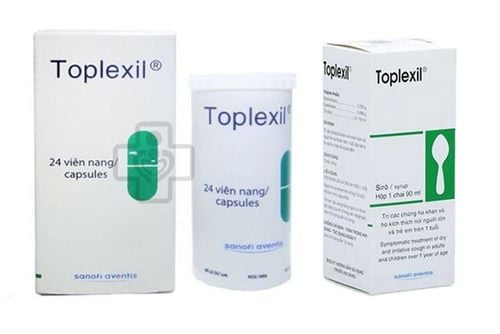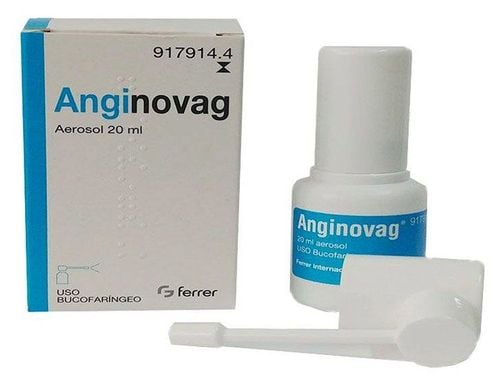This is an automatically translated article.
Atussin syrup is a medicine for cough caused by pneumonia, bronchitis, whooping cough, cough caused by flu or common cold,... The drug can be used for both infants and young children, however it is necessary to ensure Follow the exact dosage recommended by your doctor.
1. What is Atussin syrup?
Atussin syrup is often indicated for the treatment of pneumonia, pharyngitis, bronchitis, cough due to flu, whooping cough, laryngitis,... The drug is prepared in the form of a syrup, suitable for both infants and children. In each teaspoon of Atussin syrup (equivalent to 5 ml) contains the following main ingredients:
Dextromethorphan HBr with a content of 5 mg; Glyceryl Guaiacolate 50 mg; Chlorpheniramine with the content of 1.33 mg; Sodium Citrate Dihydrate with 133 mg; Ammonium chloride with a concentration of 50 mg; Phenylpropanolamine hydrochloride with a strength of 8.3 mg. In addition, Atussin syrup also contains other ingredients and excipients such as:
Povidone; Lactose ; Sodium Starch Glycolate; Starch; DC Yellow 10, FDC Blue 1; Magnesium Stearate.
2. Mechanism of action of ingredients in cough medicine Atussin syrup
*Ingredient Dextromethorphan HBr
Helps relieve cough by acting on the cough center in the medulla oblongata. This active ingredient is most effective in the treatment of non-sputum or chronic coughs. Usually, the antitussive effect of Dextromethorphan HBr lasts up to 5-6 hours.
*Ingredients Chlorpheniramine maleate
Chlorpheniramine maleate is an antihistamine with little sedation. This active substance has anti-acetylcholine and anti-histamine activity by competitive blocking between H1 receptors of effector cells.
*Some other active ingredients
Sodium citrate in Atussin syrup is a expectorant, has the ability to retain moisture and help maintain pH. Meanwhile, the ingredient ammonium chloride helps to stimulate mucous membranes and loosen phlegm in patients with coughs due to bronchitis, flu, pneumonia,... Another active ingredient, glyceryl guaiacolate, also has expectorant effect thanks to ability to reduce the viscosity of mucous membranes.
3. Indications and uses of Atussin syrup
3.1. Indications for use of Atussin syrup Atussin syrup is prescribed by doctors for cases of cough symptoms originating from causes such as: tracheobronchitis, influenza, pharyngitis, smoking a lot, inflammation lungs, working and living in environmental conditions that trigger coughs.
3.2. Uses of Atussin Syrup Atussin Syrup is a non-narcotic cough medicine that has the effect of loosening phlegm and bronchodilating. Cough medicine Atussin syrup treats phlegm in 3 directions, including allergic cough - dry cough - cough with phlegm.
Thanks to its ability to increase secretions in the respiratory tract, Atussin cough syrup effectively loosens sticky sputum, and makes it easier to expel phlegm and other bronchial secretions. This effect not only helps to clear the phlegm quickly, but also soothes the irritation of the respiratory corridors.
According to research, the effect of the dextromethorphan component in Atussin syrup has the same effect as Codeine, but it is not addictive and has fewer side effects on the gastrointestinal tract. As a result, Atussin syrup helps control the severity and frequency of coughs, and helps both lungs restore their ability to self-clean.
On the other hand, the bronchodilator, anti-congestive effect of Atussin syrup is also essential for controlling and relieving cough. This use mainly comes from the ingredient chlorpheniramine - a drug belonging to the antihistamine group, which helps inhibit the effects of histamine, thereby reducing allergic reactions, itchy nose and throat, common cold or allergic rhinitis.
4. Contraindications to use Atussin syrup for what cases?
Atussin syrup should not be used in the following cases:
People who are allergic or have a history of hypersensitivity to any ingredient in the formula, including the active ingredient and excipients. Contraindicated in patients who are taking monoamine oxidase inhibitors or are sensitive to the ingredients in the drug. Do not use the drug for people with impaired respiratory function, bronchial asthma or narrow-angle glaucoma. Do not use the drug for patients with pyloro-duodenal obstruction, peptic ulcer or urinary retention due to urethral-prostate disorders.
5. Dosage and how to use Atussin syrup
5.2. Dosage of Atussin syrup Atussin cough syrup is indicated for use in adults, infants and children with the corresponding recommended dosage as follows:
Infant dose: Each oral dose is from 1.25 – 2.5 ml (equivalent to 1/4 - 1/2 teaspoon of syrup). Dosage for children from 2 to 6 years old: Each dose takes 5 ml (equivalent to 1 teaspoon of syrup). Dose for children from 7 to 12 years old: 10 ml each dose (equivalent to 2 teaspoons of syrup). Dose for children > 12 years old and adults: Each dose is 15 ml (equivalent to 1 tablespoon of syrup). The interval between oral doses is usually 6-8 hours, used 3-4 times / day depending on the severity of the patient's cough. In order to ensure the highest effectiveness in the treatment of cough conditions due to various causes, patients should adhere to the correct dose regimen as well as the appropriate time to take the medicine as prescribed by the doctor.
5.2. How to use Atussin Syrup Before using Atussin Syrup, the patient should carefully check the label for the dosing instructions to follow correctly. You should measure the dose of medicine carefully with a special spoon or special measuring device. You should avoid using a household spoon to avoid measuring the wrong dose of medicine.
6. What to do when overdose or forget dose of Atussin syrup?
6.1. How to handle an overdose of cough medicine Atussin syrup In case of drug overdose and notice noticeable symptoms such as: urinary retention, hallucinations, nausea, vomiting, nystagmus, vision loss blurred vision, convulsions, respiratory failure, convulsions, central nervous nearest local medical facility for early treatment.
Overdosage of Atussin syrup with symptoms can be treated with the following measures:
Supportive treatment with intravenous naloxone 2mg, then repeated with a combined dose of 10mg in case necessary, needs. Gastric lavage or induce vomiting using ipecacuanha syrup; then limit the patient's body to absorb the drug with activated charcoal and bleach. Active treatment for overdose of atussin syrup causing arrhythmia and hypotension. Symptomatic treatment of seizures with intravenous phenytoin or diazepam. Blood transfusion for patients with severe overdose symptoms. 6.2. How to handle a missed dose of cough medicine Atussin syrup In case of forgetting a dose of Atussin syrup, the patient should use it as soon as he remembers at the time as soon as possible. However, if it is too close to the time for your next dose, you should skip the missed dose and take the medicine according to the schedule prescribed by your doctor. Do not take a double dose as it can cause an overdose and lead to dangerous health symptoms.
7. Some side effects of cough medicine Atussin syrup
When treating coughs with Atussin syrup, patients may experience some unwanted side effects, typically central nervous system disorders, digestive disorders and some psychiatric symptoms to some degree. light. In general, these side effects tend to subside and improve after a few days.
In addition to the above side effects, the patient may also have the following symptoms after taking the drug such as:
Fatigue, headache, dizziness; Tachycardia with diarrhea, nausea, vomiting; Hives or flushing reaction on the skin; Dry mouth; Mild drowsiness, somnolence. Not all subjects experienced the side effects listed above. In fact, there are still some other less common side effects that are not mentioned. If you have any concerns about the side effects of Atussin syrup, talk to your doctor for specific advice.
8. Precautions and some warnings when using Atussin syrup
Before using Atussin syrup, you need to tell your doctor if:
Are pregnant/breastfeeding; Are taking other medications, including over-the-counter and prescription drugs, dietary supplements or herbal products; Are allergic or sensitive to any of the active ingredients or ingredients of the drug; Have any other disorders or health conditions. Atussin syrup can act on the nervous system and cause symptoms such as drowsiness, dizziness, fatigue, drowsiness, ... Therefore, patients need to be careful when deciding to use the drug, especially are subjects with occupational characteristics that require high concentration, such as engineering, operating machinery or driving a car.
In addition, smokers with chronic cough, productive cough, asthma, respiratory failure or pneumothorax should also use caution when using Atussin syrup. In case the patient is a child with an allergy, it should also be noted before using Atussin cough syrup.
Some drugs can interact with Atussin syrup and change its ability to work or lead to side effects, including:
Tricyclic antidepressants . Monoamine oxidase (MAO) inhibitors. Both drugs, when used in combination with Atussin syrup, can increase and prolong the anticholinergic effect, and at the same time increase the sedative effect of the antihistamine group. Ideally, the patient should make a list of the drugs they are taking and notify the doctor. Avoid self-medicating, changing the dose or stopping the medication without consulting your doctor.
Atussin syrup should be stored in a place where the temperature is < 30 degrees Celsius, avoiding exposure to direct sunlight and high temperature areas such as the top of the refrigerator or television. Atussin cough syrup should also be kept out of reach of children or pets to avoid unnecessary risks.
Please dial HOTLINE for more information or register for an appointment HERE. Download MyVinmec app to make appointments faster and to manage your bookings easily.













